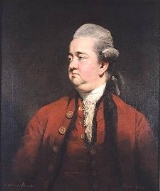
. His most important work, The History of the Decline and Fall of the Roman Empire
, was published in six volumes between 1776 and 1788. The Decline and Fall is known for the quality and irony of its prose, its use of primary sources, and its open criticism of organized religion.
Edward Gibbon was born in 1737, the son of Edward and Judith Gibbon at Lime Grove, in the town of Putney
, Surrey
. He had six siblings: five brothers and one sister, all of whom died in infancy.
The reign of Antoninus is marked by the rare advantage of furnishing very few materials for history, which is indeed little more than the register of the crimes, follies, and misfortunes of mankind.![]()
Revenge is profitable, gratitude is expensive.![]()
Amiable weaknesses of human nature.![]()
In every deed of mischief he had a heart to resolve, a head to contrive, and a hand to execute.![]()
Our sympathy is cold to the relation of distant misery.![]()
Vicissitudes of fortune, which spares neither man nor the proudest of his works, which buries empires and cities in a common grave.![]()
All that is human must retrograde if it do not advance.![]()

